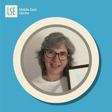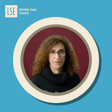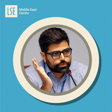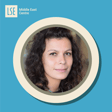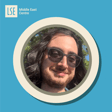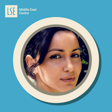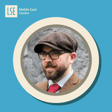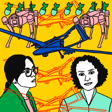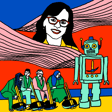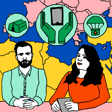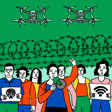Become a Creator today!Start creating today - Share your story with the world!
Start for free
00:00:00
00:00:01

Episode 1: Dana El Kurd on Researching Palestine as a Palestinian Scholar
Anne Kirstine speaks with Dana El Kurd about how she navigates her identity as a Palestinian woman scholar in academia, in the field, and in the public sphere. Dana also shares perspectives from her research on the decolonisation of social sciences.
Dana is Assistant Professor of Political Science at the University of Richmond and a Senior Nonresident Fellow at the Arab Center Washington. Her research focuses on authoritarian regimes and state-society relations in the Arab world. She is author of the book, 'Polarized and Demobilized: Legacies of Authoritarianism in Palestine'.
Transcript
Podcast Introduction
00:00:04
Speaker
Hello and welcome to Conversations on Positionality, a podcast brought to you by the LSE Middle East Centre. My name is Anne Kirsten Rohn. I'm a visiting fellow at the Centre and you're listening to the first episode of this podcast series, which explores how who we are as researchers shape the work we do.
Motivation Behind the Podcast
00:00:24
Speaker
I decided to do this podcast because I wanted to delve into some of the difficult questions I grapple with in my own work on politics in the Middle East. Questions about how my gender, my age and my national background as a European influence my relations with people in the field.
Impact of Positionality in Research
00:00:42
Speaker
And about the challenges and opportunities that come with having different research or positionalities in general.
00:00:49
Speaker
In each episode of the podcast, I invite a colleague to discuss these questions with me and share reflections from their work. And hopefully, these conversations will also provide food for thought for researchers, practitioners, and students of social sciences, and inspire new discussions about the role of positionality within academia.
Guest Introduction: Dana Elkhort
00:01:10
Speaker
In today's episode, I'm delighted to be joined by Dana Elkhort.
00:01:16
Speaker
Dana is Assistant Professor of Political Science at the University of Richmond, and a Senior Non-Resident Fellow at the Arab Centre, Washington. Her research focuses on authoritarian regimes and state-society relations in the Arab world, and her recent articles look into decolonisation of international relations and the role of pro-Palestine activism.
00:01:38
Speaker
She's also the author of the book, Polarised and Demobilised, Legacies of Authoritarianism in Palestine, which was published in 2020 with Oxford University Press. And finally, Dana participates actively in the public conversations about her subject matter. And one of the things I look forward to discussing with her is how she manages the relationship between her public engagement and her research.
Understanding 'Positionality'
00:02:03
Speaker
But before we delve into this, I want to say welcome to the podcast, Dana. Thank you for being with me.
00:02:09
Speaker
Thank you so much for having me. Dana, I would like to begin our conversation by talking about the term positionality. And the reason why I want to do that is because whenever I find myself in situations where I have to explain that term, I struggle to come up with a definition that's precise enough. So I was wondering what definition you use in your work. To be honest, when I was in grad school,
00:02:36
Speaker
I don't think I ever heard the term positionality. I went to grad school in a pretty mainstream political science department in the United States at UT Austin.
00:02:44
Speaker
And I mean, I knew intuitively that the way that my white colleagues were going to come across information and gather information and analyze information was going to be different from how I would do it. But I never received any kind of training or background on what this would entail. All of this to say that I have had to kind of evolve my own understanding of positionality as I read beyond graduate school and then immerse myself in the field in various ways.
Identity and Fieldwork
00:03:12
Speaker
So I don't know that I have the best definition or the most complete one, but I guess when I think about positionality in my own work, I'm thinking about the ways in which I bring certain types of privileges vis-a-vis my interlocutors and vis-a-vis my subject matter. And to also think about my ethnic and national identity. And this seems obvious to people, but I was surprised by it because nobody had ever mentioned it to me. Also my gender, how it might really impact some of my fieldwork experiences and my results.
00:03:41
Speaker
It's not the most pithy definition, but I think that's how I view positionality. I think that's a nice way to view it, to be honest. And I think it's very striking that you too learned about positionality at a fairly late stage. I don't remember talking about positionality explicitly before I'd started my PhD research and had signed up for these courses on ethnographic methods.
00:04:07
Speaker
So there's definitely a lot to talk about still in terms of definitions and the conceptual side of it. But I would like to move on and talk about your positionality and how you navigate that. And I think an obvious place to start that conversation would be to bring up something you mentioned before yourself, which is your nationality.
00:04:29
Speaker
you're a Palestinian and you were born in Jerusalem but you also left Palestine and that makes me interested in knowing more about how you would describe your Palestinian identity and also how that identity has played out in your work as a researcher conducting research on Palestine. Yeah it's something that is often an elephant in the room
00:04:52
Speaker
I think for a long time I was viewed with a certain level of suspicion by my American and Western colleagues. Essentially there was always a question of how rigorous could I really be in the research process given that I was Palestinian. And it took me a while to figure out why this was such a upsetting and discomforting viewpoint and to figure out
00:05:16
Speaker
how to navigate that but on the other hand also being a Palestinian with American citizenship in the diaspora going back to my home country or even in other parts of the Arab world navigating that level of privilege and
00:05:30
Speaker
being somewhat outside of the fold. That has also been interesting to navigate because I'm suspected by my Western colleagues, but as well by people from my own nationality. So that was very difficult to navigate, but you know, I have since developed my own understanding
Challenges in Academia Due to Identity
00:05:49
Speaker
of this. And so I have strong opinions about why this should not be the case and why I shouldn't be under greater suspicion.
00:05:57
Speaker
Could you perhaps give some examples of episodes where you've experienced that suspicion, coming both from your American colleagues, but also from the Palestinian interviews and scholars you engage with? A couple of different examples come to mind. For example, you know, among Western colleagues in Western spaces, even if I'm presenting something like empirical, not my own thoughts or feelings or ideas, empirical data based on what I've gathered, there's always, I felt, more of a burden of proof.
00:06:26
Speaker
about the sourcing of the material, whether I've analyzed it correctly, all of those things. At one point when I was presenting a part of my book, I remember very distinctly that somebody in that workshop space said, you know, you sound very polemical in your writing. And I had tried actually too far, I think, in my first book to be this kind of removed and analytical and neutral writer. But because I guess I mentioned
00:06:54
Speaker
occupation, and I had mentioned Israeli repression, which are just facts. That was enough for a white academic to read my work as polemical. Whereas, at least in my experience,
00:07:06
Speaker
If a white person is writing about Palestine or an Israeli person is writing about Israel, they can say something that's quite pointed and quite political and nobody bats an eyelid. So that was one of those moments actually in that workshop where I realized that this is how my work was going to be consumed. And it set me on a path to understanding and making a more forceful counter argument about my positionality, which is
00:07:33
Speaker
Nobody is neutral. Everybody has particular biases, even the white person in the field who sees a lot of times their subject matter as some sort of laboratory for them to come and understand. And even they come with certain biases and certain political positions. So that was one moment that was kind of an indicative example of that kind of suspicion that I faced. On the other hand, like I said, there is a double suspicion and I can understand that, especially in a place like Palestine.
00:07:59
Speaker
where there are these communities that are overstudied and are very wary of researchers. When I come in with a certain type of privilege and I am removed from the field, like I don't live there anymore.
00:08:11
Speaker
Even if all of my family lives there, even if there are certain ways that I'm integrated in ways that maybe my white colleagues are not, there is that level of removal and I'm coming from an American university. People can be suspicious of intention. People can be suspicious of how this data is going to be used. I never throughout my entire career have ever taken any funding from any government source.
00:08:35
Speaker
I've never applied for like a US State Department fellowship or anything like this, even though I am eligible for it. I knew that doing so would exacerbate this double suspicion that I would face. Even if I was very careful about this and I was very careful about respecting my interlocutors, there would still be sometimes weariness and suspicion and comments. So I'll give one example. I was speaking to a Palestinian graduate student who was from Palestine.
00:09:01
Speaker
and had gotten an opportunity to pursue graduate school abroad and had very strong opinions, obviously about Palestine. Just in casual conversation, she paused and looked at me and said, do you ever think about like, what's the point of all the research that you do? How are you helping Palestine in the American context? It was a hard thing for me to hear because she had voiced what a lot of Palestinians probably think privately about Palestinian researchers in the diaspora.
00:09:29
Speaker
even if they're in the diaspora, obviously, because there's been forced displacement. This is the kind of suspicion, like there must be something off with my research. It must be benefiting some third parties that is antagonistic to the Palestinian liberation movement.
Public Engagement and Research Motivation
00:09:45
Speaker
Despite the fact that my book is about US intervention and how US intervention created a particular kind of problem in the Palestinian context, despite the fact that I very explicitly write about this,
00:09:57
Speaker
I faced a lot of harassment from Arab and Palestinian activists, some academics, because there's an assumption that because I'm pursuing my career in the spaces I'm in, because I am an English speaker, because I live in the United States and all of those things.
00:10:15
Speaker
No matter how explicit I am in my writing, that doesn't protect me. That sounds like a difficult position to be in really. I must say when I hear you speaking about the pressure you face, it makes me wonder what drives you to continue engaging in these public debates. And I say this because for my own part, I'm often slightly cautious about voicing my opinions on my subject matter.
00:10:39
Speaker
for instance, engaging in debates about how Western foreign policy in the Middle East should look like. And I think that is essentially because I'm also concerned about the pushback I might face. So I'm interested in knowing what you do to deal with the pushbacks that you face. And also what do you do to protect your credibility as a researcher in all of this? I think that I continue to be publicly engaged on the subject matter that I research in my academic work.
00:11:07
Speaker
for a variety of reasons. One, because I actually firmly believe it's a professional responsibility of academics to benefit the public in some way from the research that they're doing. I mean, for me, it's both a moral and professional obligation. And I'm cognizant of the fact that I do have these privileges. It is really a waste if I don't utilize those privileges because what academics in the Arab world face
00:11:32
Speaker
under authoritarian regimes or like under the Israeli occupation. For me, when I think about it in that kind of comparative sense, I think, okay, that kind of harassment is a drop in the bucket compared to actual threat. So I'll take that on. I think the US government and US policymakers and decision makers need to have pushback on some of the policies that they pursue. I do sometimes express opinion, but I am never expressing opinion from a point without backed evidence.
00:12:02
Speaker
So my research helps inform my opinion and you know my research has helped shift my opinions over the years. I feel like I integrate my academic work into that public engagement and hopefully because I am backing my claims with
00:12:18
Speaker
research that has been peer reviewed and published in political science journals and things like that, that adds weight to the claims that I'm making. So that's one reason I do it. Another reason I do it is also because I refuse to back down because of the pressure of the loudest and most bullying voices. Because I'm a Palestinian, my family is from there. I still have family there. I would like to have a future there.
00:12:47
Speaker
And I have a right to speak on issues that will impact me, impact my family, impact my children. So I think it's a stubbornness also on some level. I refuse the entire idea that only certain types of voices.
00:13:01
Speaker
are allowed to speak on these topics, whether it's the quote-unquote white neutral scholar or whether it's only a certain type of Palestinian, only a certain type of Arab. I just refuse that. In terms of impacting my credibility though, I'm sure there are some academics who see my public engagement as a lack of neutrality, a lack of rigor. But my position is that I can be objective without being neutral. And I am, but I'm allowed to have opinions and they're backed by
00:13:30
Speaker
claims that have been cooperated by research.
Navigating Positionality in Fieldwork
00:13:33
Speaker
As long as I'm doing that, I don't think it should impact my credibility. I know that that's an ideal, but that's at least my position. It's very interesting to hear these reflections, honestly. And I think the way you compare the suspicion that you face to the repression, research is an authoritarian settings experience, speaks very much to what you said before about being aware of your privileges as a researcher.
00:13:59
Speaker
I would like to move a bit beyond your public engagement now and talk about how you navigate your positionality when you're in the field. Because I'm curious as to how you experience the intersection between different aspects of your positionality. The fact that you're a woman, you're young and also the fact of course that you're a Palestinian living in a diaspora.
00:14:23
Speaker
How do you approach these intersecting identities when trying to gain access to people and conducting interviews? Again, the way that I approached this was kind of a learning process. I didn't necessarily go into field work at any point. Having a clear strategy about this kind of developed it over time, especially as I became more experienced. But I intuitively understood that my positionality would mean that
00:14:50
Speaker
there are certain types of people that I do not have access to. So that pushed me to broadening the types of methods I use because I knew that certain types of people would be inaccessible. So I'll give you an example. As a Palestinian, I'm not going to be interviewing Israeli officials. That's not going to happen. When I was a graduate student, I remember a very nice professor giving me the advice that I should go and do work in Jordan on the Jordanian military.
00:15:17
Speaker
And it never occurred to him that as a Palestinian, that is not possible. So I intuitively understood that there would be certain people, certain spaces that are off limits to me. And so I would have to get pretty good at mixed methods so that I could triangulate data in different ways, depending on my research question. And at the same time, as I became more experienced, I also understood how to leverage my positionality. My positionality wasn't always a limitation. Sometimes it could allow me access in ways
00:15:46
Speaker
that other people didn't have. I utilized that as well. Yes, I'm a Palestinian in the diaspora, but I was born in Jerusalem. I still have family in Jerusalem. I immigrated at a slightly older age to the United States. And so there are ways in which that kind of decisionality helps provide access to certain types of information and people and spaces that I wouldn't have had otherwise.
00:16:11
Speaker
And then being a woman also helped provide me access in later research. For example, in some of my research on activism in the Gulf, being a woman gave me insight and access to spaces that I think I would never have had otherwise. What kind of spaces would that be, for instance? So like there were these private women's salons that would occur in Qatar, for example, that there's no way had I not been an Arab woman what I have been invited to observe.
00:16:41
Speaker
They were very enriching to my understanding of the landscape of civil society in these very repressive environments. But at the same time, being a woman, being a Palestinian, being young, as you said, was also incredibly difficult to navigate sometimes because male-dominated spaces that includes academia, that includes, for example, certain government ministries and things like that, that I had to access for my first book, it was difficult to
00:17:10
Speaker
garner the same respect and garner the same care and diligence. So there were ways in which I honestly hadn't even considered gender very much when I was entering the field site for the first time. And that was a steep learning curve for me. But then as I immersed myself, I realized that there are ways to leverage your positionality and to leverage your closeness to the subject matter.
00:17:36
Speaker
to do, first of all, interesting work to look at questions and dynamics that people hadn't considered before and also gain access to information that you otherwise wouldn't have.
Decolonization and Diversity in Academia
00:17:47
Speaker
I would like to pick up on what you said about the imbalance in academia because this is something you address in your recent article about the decolonization of international relations, which just came out earlier this year in the review of international studies. So to give the listeners a little bit of context,
00:18:05
Speaker
In the article, you reflect on your experiences at the Doha Institute for Graduate Studies and the Arab Centre for Research and Policy Studies in Qatar, where you were previously employed. You argue in this article that academia would benefit from having a greater diversity, both among professors and students, but also among the authors that feature in the syllabi. And this is something that I feel, at least in some circles, have become accepted as the standard point of departure.
00:18:33
Speaker
But at the same time, I think we sometimes forget to talk about what exactly it is that academia gains from having a wider representation of diverse positionalities. And that's why I was wondering if you could say a bit about this based on your experiences from Doha. So a lot of my work was
00:18:54
Speaker
providing a space for Arab and regional scholars to build their scholarship and their academic contributions in an environment that wasn't so exclusionary. And there's a variety of ways that the Doha Institute and the Arab Center accomplish this that I mentioned in my article. So there are these events that are put together. There are the journals that the Arab Center puts out that have provided really unmatched space in the region for Arab scholarship.
00:19:22
Speaker
And also the fact that the Doha Institute is a space for students from the region to come largely on scholarships and get a higher degree and use it as a jumping off point. It's really unparalleled. And I saw what a value added that was because there are particular unique experiences and positionalities and lenses that these kinds of students bring to their research and the faculty also from the region bring to their research.
00:19:51
Speaker
you know, if we just waited for them to kind of find their way through English speaking scholarship, we would miss so much of the kind of analytical insight that those kinds of lenses and positionalities bring. I myself, like I said, I was largely trained in a mainstream political science program. I honestly had very little engagement with Arabic language scholarship beyond raw data. And when I went and worked there,
00:20:19
Speaker
the impact it has had on my scholarship. I can't even stress how much it has enriched my scholarship. At the same time, though, that kind of diversification is a starting point, but it can really stall if we focus just on the sheer number of people who are being published or the sheer amount of events, rather than really interrogate how we're teaching and understanding these disciplines. Something I did see at the Doha Institute was that a lot of that kind of effort
00:20:49
Speaker
did sometimes veer into the performative. So for example, the syllabi didn't necessarily always feature Arabic language scholarship, even when it was very readily available, even when the language of instruction is supposed to be in Arabic. At the same time, there was this pretending localism on the part of a lot of scholars that might have had ties to the region, but weren't reflecting very well on their own positionalities. They weren't reflecting on the privileges they brought
00:21:18
Speaker
scholars who are based in Western universities and maybe they do a little interlude in the region and return. And there was not a lot of critical thought about how their work wasn't necessarily a regional perspective either. They needed to be more honest about the kinds of contributions they were passing off as a regional contribution because that also distorted how larger academia, how it was viewing the regional contribution, quote unquote.
00:21:48
Speaker
And I say this as somebody that fits that position. I cannot pass my work off as completely scholarship from the region. I have to be more critical about my own biases and my own privileges.
Future of Academic Diversity and Conclusion
00:22:05
Speaker
And if that same research question was addressed by somebody that works at a national university or somebody who writes largely in Arabic or something like that, it would come to different conclusions.
00:22:17
Speaker
Yeah. So, so anyway, not to ramble, but that was the point of that article is to say like we need to be more careful about what we identify as like a decolonization effort on both ends. It can't be performative in either by Western scholars nor by regional scholars.
00:22:37
Speaker
Yeah, it's a difficult balance to strike really. And I think what you just said before is a good reminder of exactly how complex a task it is to decolonize and to further improve the diversity within academia. But at the same time, I feel these critical conversations have the potential to push us further in the direction of more diversity.
00:23:00
Speaker
And I say so thinking of places I know where this topic is still not being discussed very explicitly and very frequently. So to be honest, I would love to do a podcast with you in maybe five or 10 years from now, where we look back at what has happened, and hopefully also the progress that has been happening. Yeah, no, I completely agree. And I will say I think that people are speaking about it more definitely. And I think maybe
00:23:30
Speaker
I'm not sure about the British context, but I think the European context maybe speaks about it more than the American context. But yeah, hopefully in five to 10 years, when Arabic language scholarship is seen at the same level and is integrated into the disciplinary discussion at the same level as English language scholarship, then we can say, okay, we've made some progress, but we're trying, we're trying until that point.
00:23:52
Speaker
Yeah, it will be interesting to see what the future will bring. And honestly, that could be the topic of a whole new podcast episode, which we don't have time for because our time is up now. And all I have left to say is a big thank you, Dana, for joining me on the podcast and for sharing your thoughts and reflections. I think it's been a really fascinating conversation and something I look forward to continuing outside of this podcast with you. Thank you so much for having me.
00:24:27
Speaker
And that was all you had for this episode of Conversations on Positionality. Thanks to the team at the LSE Middle East Centre for their work on the podcast and thank you to the listeners for tuning in.
00:24:38
Speaker
In the next episode, I continue the conversation together with Professor Simon Maben from Lancaster University. Simon and I will discuss a range of interesting and sensitive topics, including how to address one's privileges and how to discuss positionality with graduate students. I hope to see you next week.
